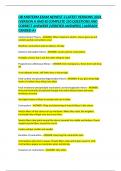Exam (elaborations)
OB MIDTERM EXAM NEWEST 2 LATEST VERSIONS 2024 (VERSION A AND B) COMPLETE 250 QUESTIONS AND CORRECT ANSWERS (VERIFIED ANSWERS) |ALREADY GRADED A+
- Course
- Institution
- Book
OB MIDTERM EXAM NEWEST 2 LATEST VERSIONS 2024 (VERSION A AND B) COMPLETE 250 QUESTIONS AND CORRECT ANSWERS (VERIFIED ANSWERS) |ALREADY GRADED A+
[Show more]



